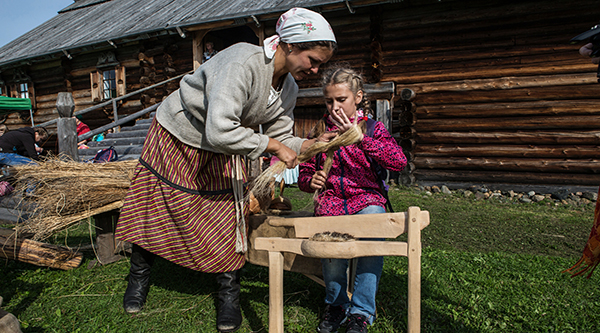"PROZVET (Promoting Sustainable Development in Zabaikal and Karelia districts of Russia) is an European Union project aimed at enabling innovative forms of cooperation among civil society organisations (CSO), Local Authorities (LA), and non-traditional stakeholders.
The project, started in 2020, is conducted through a partnership between the Karealian NGOs Resource Centre, the Zabaikal Union of Women, the Russian NGO Zvezda Nadezhdy, the Italian Association FELCOS-Umbria (the project leader), and LEF-Italia, Italian Coordination of the European Women’s Lobby, and ILS LEDA.
In September 2021 the European Union realised a Result Oriented Monitoring (ROM), an external monitoring system aimed at enhancing the European Commission's internal control, accountability and management capacity on the Project, with a strong focus on results.
In PROZVET case, the monitor considered the intervention entirely consistent with partner country priorities and policies and geared towards the needs of the beneficiaries. She highlighted the relevance of project activities in light of the changes brought by the COVID-19 pandemic during project year 1, which exacerbated the vulnerabilities of rural women in the territory.
The implementation mechanisms, and so our RESCO tools, were deemed as adequate to achieve the expected Outcomes.
Furthermore, the intervention is believed to be benefitting:
1) from the implementing partners’ strong assets, which lie in long-established contacts with key stakeholders, contributing to appropriate engagement and ownership on the part of stakeholders; and,
2) from adequate EU added value. The EU is deemed to be one of the stable donors in Russia involved in strategic engagement with civil society and local authorities.
Most of the preparatory activities were completed with good quality, data collected through different surveys, mainly the Resco assessment of the tourism vale chain, and the correspondent Strategic Guidelines developed and submitted to the authorities, and grant schemes launched for Civil Society Organisations (CSOs) and women.
The report assigned relevant consideration to the next phase bringing value to the planning document, in accordance to the tourism value chain strategic guidelines, provided through the RESCO methodology, and favourably accepted by stakeholders.
ROM regarded Capacity Building as an essential part of the intervention in which the exchange of experience and knowledge between the Italian partners – among which ILS LEDA – and the Russian partner and stakeholders is one of the intervention’s strongest features. In fact, despite travel restrictions imposed in 2020, partners were able to find rapid solutions to pursue, remotely, an effective exchange process.
In conclusion, from the monitoring process, it emerged that the intervention is directly contributing to achieving gender equality and human rights outcomes. Women are still fighting inequality in many sectors, and the typical manifestation of discrimination against women is poverty. COVID-19 has exacerbated the problem resulting in many women finding themselves unemployed. The development of small businesses in the tourism value chain – promoted by the project – was deemed to be one of the best options to achieve this balance.

